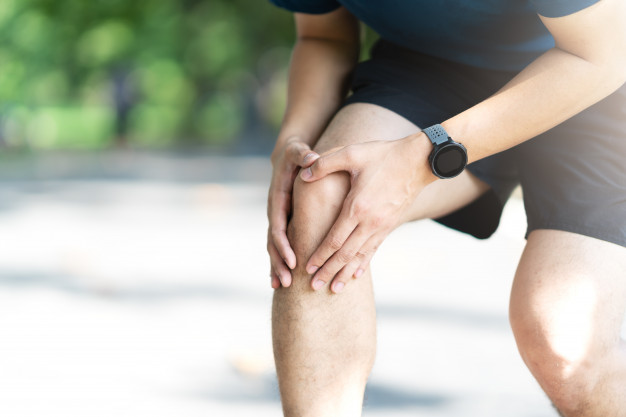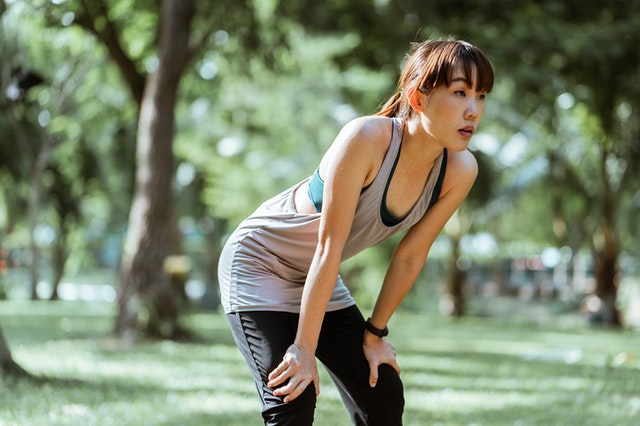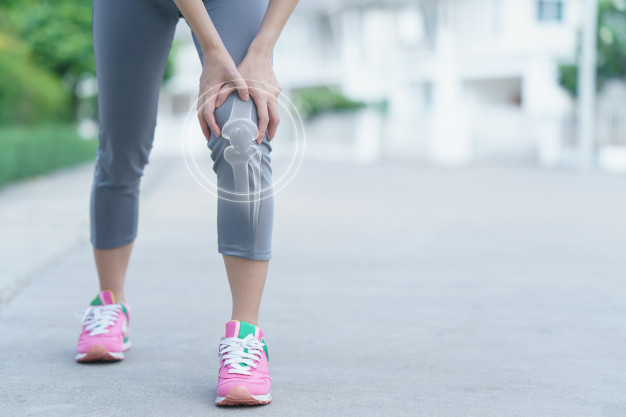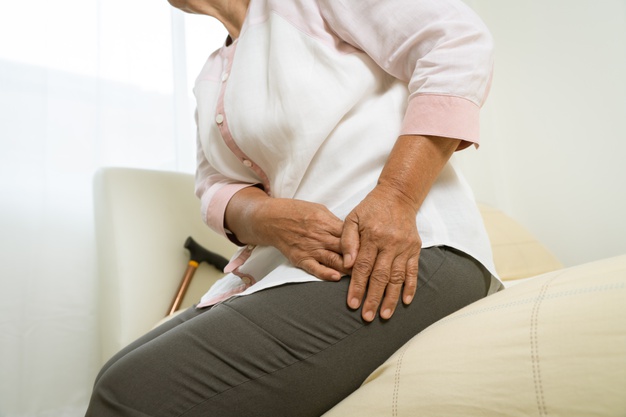TREATMENT FOR KNEE JOINT SWELLING OR SWOLLEN KNEE

KNEE JOINT SWELLING OR SWOLLEN KNEE
A swollen knee or knee joint swelling occurs when excess fluid accumulates in or around your knee joint. This condition is also called an effusion in your knee joint or "water on the knee."
A swollen knee or knee joint swelling may be the result of trauma, overuse injuries, or an underlying disease or condition. To determine the cause of the swelling, your doctor might need to obtain a sample of the fluid to test for infection, disease or injury.
Removing some of the fluid also helps reduce the pain and stiffness associated with the swelling. Once your doctor determines the underlying cause of your swollen knee, appropriate treatment can begin.
SYMPTOMS
- Swelling. The skin around your kneecap can puff up noticeably, especially when you compare the affected knee to the normal one.
- Stiffness. When your knee joint contains excess fluid, you might not be able to bend or straighten your leg completely.
- Pain. Depending on the cause of the fluid buildup, the knee might be very painful — to the point that it's difficult or impossible to bear weight on it.
CAUSES
Many types of problems, ranging from traumatic injuries to diseases and other conditions, can cause a swollen knee.
Injuries-Damage to any part of your knee can cause excess joint fluid to accumulate. Injuries that can cause fluid buildup in and around the knee joint include:
- Torn ligament, particularly the anterior cruciate ligament (ACL)
- Cartilage (meniscus) tearIrritation from overuse
- Irritation from overuse
- Broken bones
Diseases and conditions-Underlying diseases and conditions that can produce fluid buildup in and around the knee joint include:
- Osteoarthritis
- Rheumatoid arthritis
- Infection
- Gout
- Pseudogout
- Bursitis
- CystsTumors
- Tumors
RISK FACTORS
- Age. Your likelihood of developing a swollen knee related to arthritis increases as you age.Sports. People who participate in sports that involve twisting the knee, such as basketball, are more likely to experience the types of knee injuries that cause swelling.
- Sports. People who participate in sports that involve twisting the knee, such as basketball, are more likely to experience the types of knee injuries that cause swelling.
- Obesity. Excess weight puts added stress on the knee joint, contributing to the tissue and joint overload and knee degeneration that can lead to a swollen knee. Obesity increases your risk of osteoarthritis, one of the more frequent causes of knee swelling.
COMPLICATIONS
Complications of a swollen knee or knee joint swelling can include:
- Muscle loss. Fluid in the knee can harm the working of your muscles and cause thigh muscles to weaken and atrophy.
- Fluid-filled sac (Baker's cyst). The buildup of fluid in your knee can lead to the formation of a Baker's cyst in the back of your knee. A swollen Baker's cyst can be painful, but usually improves with icing and compression. If the swelling is severe, you might need to have fluid removed (cyst aspiration).
PREVENTION
A swollen knee or knee joint swelling is typically the result of an injury or chronic health condition. To manage your overall health and prevent injuries:
- Strengthen the muscles around your knee. Strong muscles around a joint can help ease pressure on the joint itself.
- Choose low-impact exercise. Certain activities, such as water aerobics and swimming, don't place continuous weight-bearing stress on your knee joints
- Maintain a healthy weight. Excess weight contributes to the wear-and-tear damage that can lead to a swollen knee.
DIAGNOSIS
- X-ray. An X-ray can rule out broken or dislocated bones, and determine if you have arthritis.Ultrasound. This test can check for arthritis or disorders affecting the tendons or ligaments.MRI. This test can detect tendon, ligament and soft tissue injuries that aren't visible on X-rays.
- Ultrasound. This test can check for arthritis or disorders affecting the tendons or ligaments.MRI. This test can detect tendon, ligament and soft tissue injuries that aren't visible on X-rays.
- MRI. This test can detect tendon, ligament and soft tissue injuries that aren't visible on X-rays.
- Joint aspiration (arthrocentesis).To check for the presence of blood, which may stem from injuries or bleeding disorders or bacteria, which may be causing an infection or crystals common to gout or pseudogout.
TREATMENT
Treatment varies, depending on the cause of the swollen knee, its severity and the medical history. Treatment generally involves pain medication and procedures to remove fluid from the knee joint.
1.Medications
To ease inflammation, your doctor might suggest an oral corticosteroid, such as prednisone. Other types of steroids can be injected directly into your knee joint.
2.Surgical and other procedures
Treating the underlying cause of a swollen knee might require:
- Arthrocentesis. Removing fluid from the knee can help relieve pressure on the joint. After aspirating joint fluid, your doctor might inject a corticosteroid into the joint to treat inflammation.
- Arthroscopy. A lighted tube (arthroscope) is inserted through a small incision into your knee joint. Tools attached to the arthroscope can remove loose tissue or repair damage in your knee.
- Joint replacement. If bearing weight on your knee joint becomes intolerable, you might need knee replacement surgery
3.Your doctor might also recommend physical therapy to improve your knee's function and strength.
4.Lifestyle and home remedies
Taking care of yourself when you have a swollen knee includes:
- Rest. Avoid weight-bearing activities as much as possible.Ice and elevation. To control pain and swelling, apply ice to your knee for 15 to 20 minutes every two to four hours. When you ice your knee, raise your knee higher than the level of your heart, using pillows for comfort.
- Ice and elevation. To control pain and swelling, apply ice to your knee for 15 to 20 minutes every two to four hours. When you ice your knee, raise your knee higher than the level of your heart, using pillows for comfort.
- Pain relievers. Over-the-counter medicines such as acetaminophen or ibuprofen can help reduce your knee pain.
Our Branches
Valasaravakkam
Kotturpuram
EFFECTIVENESS OF ACUPUNCTURE TREATMENT:
From acute injury to chronic or arthritic knee pain, acupuncture is an effective tool to manage and resolve pain naturally. Acupuncture has been shown to be very effective in treating knee pain and swollen knees.Acupuncture not only helps the body release internal opioids which are the body’s own painkillers, but also helps to increase blood flow to painful areas, helping damaged tissues recover.Apart from treating osteoarthritis of the knee, Acupuncturist. A. Shaji Bharath is skilled in using acupuncture to treat acute sports injuries, such as ACL, MCL, and meniscus tears. Many patients receive acupuncture directly after injury to minimize pain and swelling and throughout the recovery process to encourage tissue regrowth and joint mobility.Hence, Acupuncture is considered as the best remedy to treat swollen knees.
MECHANISM OF ACUPUNCTURE
Acupuncture increases blood flow to the injured area. Blood brings healing properties such as platelets and red blood cells which lead to faster recovery. When that increase in blood flow leaves it pulls out toxins and fluid buildup which in turn decreases inflammation. When there is less inflammation and swelling there is less pressure and pain.
Acupuncture releases endorphins and serotonin as natural pain medication.Your natural pain killers can be stronger than morphine. You get natural pain relief without the harsh unwanted side effects of medication.
Acupuncture reduces trigger points in the muscles and swelling around the knee. When muscles get tight, they get sore, achy and result in decreased movement in an area. Acupuncture releases these trigger points without the need to inject medication. This makes for a natural approach to relieve tight muscles and trigger points.
Studies have shown the effectiveness of acupuncture to relieve pain for various causes of knee pain such as arthritis, “runner’s knee”, strains and sprains. Acupuncture also relieves pain while waiting for surgical intervention and can occasionally make surgery unnecessary. If you’re suffering from knee pain, stiffness or swelling you need acupuncture for relief.
BEST CURE FOR SWOLLEN KNEE OR KNEE JOINT SWELLING
Looking for the best relief for knee joint swelling in Chennai, here’s why you should reach out to the expert Acupuncturist. A. Shaji Bharath from the best rated clinic Dr.Bharath’s Acu Heal. He is currently treating patients for a wide range of conditions. As a best acupuncture practitioner 15 years of experience, and having worked with several orthopedician, Acupuncturist. A. Shaji Bharath can create the treatment plan for the best cure for knee joint swelling to manage the condition that's tailored to your needs, which can break a cycle of long-lasting swelling in the knee joint. As the top acupuncture doctor in Chennai he has witnessed acupuncture doing wonders for people suffering from knee joint swelling. The effectiveness rate increases several times just with one course of Acupuncture. So, take some time to find the right pain management and best remedy for acupuncture approach that suits you. Most of the people swear by acupuncture, citing it as a best cure and a ‘miracle’ to improving their quality of life. To contact the top acupuncture doctor in Chennai, Dial: +91 9884746916 or Visit: drbharathsacuheal.com for more details.
BEST ACUPUNCTURE DOCTOR NEAR ME
To choose the Best doctor for Acupuncture, it's important that the Acupuncturist should have a decade of experience and treated at least 1000 to 2000 patients.
You can also search for the Best Acupuncture Doctor near me or ask your primary care physician to refer an experienced Acupuncturist nearby. Once you find the Best Acupuncture Doctor in Chennai, you may go through their google reviews first and then fix an appointment with the doctor only when you are satisfied with the reviews.
The Best Acupuncture Doctor should address your concerns and help you feel more comfortable before your first session. Acupuncture usually takes numerous sessions or several weeks to get a complete cure in any ailment but within 3 or 4 sessions the patients will experience positive differences.
BEST ACUPUNCTURE CLINIC NEAR ME
There are numerous clinics popping up and it is sometimes skeptical to choose the best or even the safe one. To address such concerns, you can look into the following points to choose the best acupuncture clinic for treating knee joint swelling. Acupuncture is also offered in hospital, pain clinics and by healthcare organizations but it is ideal to visit the best Acupuncture Clinic. If you are not sure, it would be a good idea to contact your local doctor to see if they would be prepared to refer to the best rated acupuncture clinics.Acupuncture is offered in top rated acupuncture clinics near me because conventional treatment has failed or produces unacceptable side effects. Most of the best acupuncture clinics will spell out very clearly what type of acupuncture they practice and how professional they are - at present anyone can set themselves up as an acupuncturist but reputable practitioners will belong to an organization. So while you are filtering the best clinics for acupuncture that treats knee joint swelling, you can look out for these factors. Treatment without surgery for knee joint swelling is possible through acupuncture and it gives the best result.
We have been rewarded a 5-star rating from Google & Practo. You can also check the reviews there.
THE BOTTOM LINE
For many cases of knee swelling, the RICE method will not help ease inflammation and reduce swelling. The use of over-the-counter anti-inflammatory medications can also turns to be ineffective.If you’re concerned about swollen knees, have chronic knee pain, or you’re experiencing other symptoms and want to get the best treatment,seek the help of Acupuncturist. A. Shaji Bharath by dialing +91 9884746916 or Visit: drbharathsacuheal.com for more details.
SCIENTIFIC REFERENCES
- Whittingham M, Palmer S, Macmillan F. Effects of knee pain and knee pain treatments: a randomized controlled trial. The Journal of orthopaedic and sports physical therapy. 2004;34(9):504–510.
- Roos EM, Lohmander LS. The Knee injury and Osteoarthritis Outcome Score (KOOS): from joint injury to osteoarthritis. Health and quality of life outcomes. 2003;1(1):64.
- Acupuncture for knee osteoarthritis with sensitized acupoints: results from a pilot, feasibility randomized controlled trial.Jia P, et al. Pilot Feasibility Stud. 2020.PMID: 33005432
For further clarifications or
to fix an Appointment
Thank you for choosing us
Our experts will get back to you at the earliest
or
FAQ:
What are the services provided for knee joint swelling by Dr. Bharath’s Acu Heal?
A swollen knee or knee joint swelling occurs when excess fluid accumulates in or around your knee joint. This condition is also called an effusion in your knee joint or "water on the knee, " or maybe it's the result of trauma, overuse injuries, or an underlying disease or condition. The causes also occur due to torn ligament, particularly the anterior cruciate ligament (ACL), cartilage (meniscus) tear, irritation from overuse, broken bones.
Acupuncture treatment will be given based on the disease’s chronicity and acuteness. In the first few sessions, there will be a positive change in the symptoms and after several sessions, there will be an 80% to 95% chance that the patient will get cured of joint pain and swelling in the knee. This treatment will induce sound sleep which will help and play a vital role in reversing the ailment. Simultaneously the patient will be advised on a diet and exercise regime.
What are the benefits of acupuncture for knee joint swelling?
This is a drugless therapy and there are no side effects. After completing the course of treatment any form of medication can be stopped.
How many sessions do you need for knee joint swelling?
Depending upon the severity, it takes around 20 to 30 sessions in a period of 2 to 3 months.



 TREATMENT FOR KNEE PAIN
TREATMENT FOR KNEE PAIN
 TREATMENT FOR JOINT PAIN IN KNEES
TREATMENT FOR JOINT PAIN IN KNEES
 TREATMENT FOR DEGENERATIVE HIP DISEASE
TREATMENT FOR DEGENERATIVE HIP DISEASE
